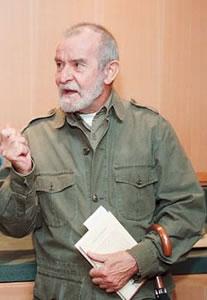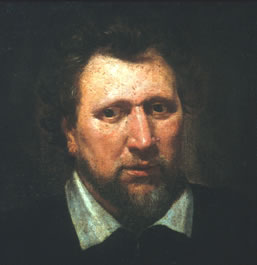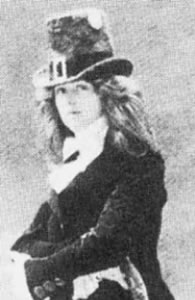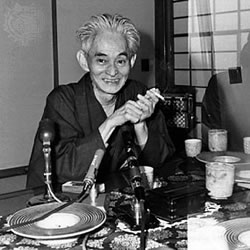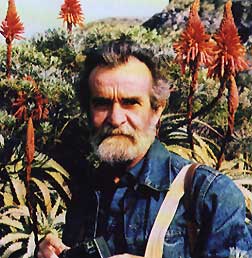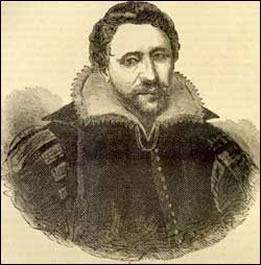De Amerikaanse schrijver William Styron werd op 11 juni 1925 in Newport News in de staat Virginia geboren. Zie ook mijn blogs van 11 juni 2006, van 4 november 2006. en mijn blog van 11 juni 2007 en ook mijn blog van 11 juni 2008.
Uit: Darkness Visible
„I was feeling in my mind a sensation close to, but indescribably different from, actual pain. This leads me to touch again on the elusive nature of such distress. That the word “indescribable” should present itself is no fortuitous, since it has to be emphasized that if the pain were readily describable most of the countless sufferers from this ancient affliction would have been able to confidently depict for their friends and loved ones (even their physicians) some of the actual dimensions of their torment, and perhaps elicit a comprehension that has been generally lacking; such incomprehension has usually been due not to a failure of sympathy but to the basic inability of healthy people to imagine a form of torment so alien to everyday experience. For myself, the pain is most closely connected to drowning or suffocation—but even these images are off the mark. William James, who battled depression for many years, gave up the search for an adequate portrayal, implying it near-impossibility when he wrote in The Varieties of Religious Experience: “It is a positive and active anguish, a sort of psychical neuralgia wholly unknown to normal life.”
The pain persisted during my museum tour and reached crescendo in the next few hours when, back at the hotel, I fell onto the bed and lay gazing at the ceiling, nearly immobilized and in a trance of supreme discomfort. Rational thought was usually absent from my mind at such times, hence trance. I can think of no more apposite word for this state of being, a condition of helpless stupor in which cognition was replaced by that “positive and active anguish.” And one of the most unendurable aspects of such an interlude was the inability to sleep. It had been my custom of a near-lifetime, to settle myself into a soothing nap in the late afternoon, but the disruption of normal sleep patterns is a notoriously devastating feature of depression; to the injurious sleeplessness with which I had been afflicted each night was added the insult of this afternoon insomnia, diminutive by comparison but all the more horrendous because it struck during the hours of the most intense misery.“
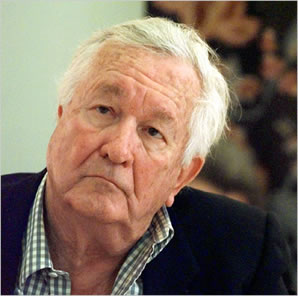
William Styron (11 juni 1925 – 1 november 2006)
De Nederlandse schrijfster Sophie van der Stap werd geboren in Amsterdam op 11 juni 1983. Het Barlaeus Gymnasium en haar verre reizen brachten haar tot de studiekeuze politicologie, met als afstudeerrichting ontwikkelingssamenwerking. Deze weg werd abrupt onderbroken, toen ze in 2005 te horen kreeg dat ze kanker had. Ze hield al haar ervaringen met betrekking tot haar ziekte en het gevecht ertegen gedurende 54 weken bij in een weblog en een dagboek. Ze debuteerde in 2006 met haar roman “Meisje met negen pruiken”. Bij het verschijnen van de Duitse vertaling van haar debuutroman zond het Duitse televisiekanaal ZDF de uitgebreide reportage Das Mädchen mit den neun Perücken uit over Sophie in haar reeks 37°. In 2007 richtte Sophie samen met Walter Scheffrahn en Jurriaan van Dam de stichting Orange Ribbon International op. De liefdadigheidsinstelling heeft zich ten doel gesteld om wereldwijd alle vormen van kinderkanker te bestrijden. Sophie is de internationale ambassadeur van Orange Ribbon International. In april 2008 verscheen haar tweede roman “Een blauwe vlinder zegt gedag”. In juni 2009 presenteerde ze in het NKI-AVL het eerste luisterboek van “Meisje met negen pruiken”. Momenteel woont en werkt Sophie het merendeel van haar tijd in Parijs aan haar derde boek en is een verfilming van “Meisje met negen pruiken” in voorbereiding.
Uit: Meisje met negen pruiken
“‘Tja, Lange Wapper kan een heleboel. Maar het beste is hij in stil zijn. “De stilte bewaren, zegt hij dan, is als het leven vasthouden.” Het leven dat jou en mij verbindt. Jou en mij, jij en ik, Lange Wapper en Sophie. Verbonden zijn we door een beetje vocht dat ons door een dun draadje verbindt. Samen luisteren we graag naar de muziek van dat draadje, de klank van al die luchtbelletjes en pompgeluidjes bij elkaar. Dan genieten wij van de stilte totdat Lange Wapper het gevaar hoort naderen en zijn piep weer laat horen. Want dan komen de zusters weer aansnellen en gaan de lichten weer aan. De stilte laat zijn plaats dan eensklaps veroveren door een schelle stem. De stem van mijn lange vriend, die eveneens eensklaps verandert in een felle strijder die zich met al zijn krachten ontfermt over mij. Maar gelukkig gaan de lichten altijd weer uit en worden we weer alleen gelaten met onze vredige stilte. Slechts onze stilte en een beetje vocht, dat ons met een dun draadje verbindt.’
(…)
‘Zoenen, knuffelen en vrijen. Passie en seks. Toch nog maar even langs bij mijn pruikenwonder om wat extra plakkertjes te kopen en zo mijn pruiken wat seksbestendiger te maken. Zonder pruik vrij ik niet, mijn haar ligt altijd op de rand van het bed. Ik vind het nog moeilijk me helemaal te laten gaan bij Rob, uit angst dat hij schrikt voor de bagage die ik mee naar bed neem. Ik leef zo in mijn eigen wereld. Misschien dat ik daarom ook wel zo aan mijn pruiken vasthoud, die kale kop is zo confronterend.’

Sophie van der Stap (Amsterdam, 11 juni 1983)
De Britse dichteres en schrijfster Renée Vivien (eig. Pauline Mary Tarn) werd geboren op 11 juni 1877 in Londen. Zie ook mijn blog van 11 juni 2007 en ook mijn blog van 11 juni 2008.
Prolong the Night
Prolong the night, Goddess who sets us aflame!
Hold back from us the golden-sandalled dawn!
Already on the sea the first faint gleam
Of day is coming on.
Sleeping under your veils, protect us yet,
Having forgotten the cruelty day may give!
The wine of darkness, wine of the stars let
Overwhelm us with love!
Since no one knows what dawn will come,
Bearing the dismal future with its sorrows
In its hands, we tremble at full day, our dream
Fears all tomorrows.
Oh! keeping our hands on our still-closed eyes,
Let us vainly recall the joys that take flight!
Goddess who delights in the ruin of the rose,
Prolong the night!

Renée Vivien (11 juni 1877 – 10 november 1909)
De Franse schrijver Jean-Pierre Chabrol werd geboren op 11 juni 1925 in Chamborigaud. Hij groeide op in het hart van de Cévennes en kreeg zijn opleiding in Alès. In 1944 sloot hij zich aan bij het Franse verzet. Hij werkte als journalist en tekenaar voor l’Humanité. Louis Aragon spoorde hem aan om zijn eerste roman te schrijven, La dernière cartouche. Hij raakte bevriend met mensen als Georges Brassens, Léo Ferré, Jacques Brel, Pierre Mac Orlan, werkte veel mee aan radio –en televisieprogrammá’s en maakte talrijke reizen.
Uit: Le crève Cévenne
„C’est long de mourir. C’est insupportable, une langueur ! Y aurait de quoi se flinguer un bon coup. Surtout quand il ne s’agit pas que de sa propre mort, quand se mourir soi-même ne suffit plus, quand il faut bien, se mourant, mourir aussi son pays. Crever sa mort dans la mort de sa terre. On ne peut que rester le soir au coin de sa cheminée, quand on en a encore une, à regarder flamber les dernières bougnes des derniers mûriers. Mais il y a pire, mais il est des soirs, des nuits, l’hiver surtout, par des temps à ne pas mettre un assureur dehors, où personne ne passe, où personne ne vient s’accroupir dans l’autre coin, outre-flammes. Alors on se résout à sortir, à chercher un toit, un autre feu, un autre coin, un autre agonisant, un mourant veinard qui voit, lui guilleret, quelqu’un venir mourir avec lui dans la crève du vieux pays.
Les feuilles mortes ont un tel poids qu’elles font crier le sol. À ne plus passer sous les arbres. Les voitures ont de bons freins. La rue-route du village, l’artère unique, est une immensité de frissonnantes grisailles. À cette heure,
en ce lieu, un cri d’enfant paraît déplacé, choquant même, c’est une atteinte aux bonnes mœurs.
Le vieux Socrate est couché, sans connaissance depuis quatre semaines. Son cousin Platon en est à sa troisième attaque, je l’entends gémir derrière les volets de la fenêtre à gauche de ce cadran solaire qui porte en exergue, sous les heures : « Chacune d’entre elles blesse, la dernière tue ».

Jean-Pierre Chabrol (11 juni 1925 – 1 december 2001)
De Engelse dichter en schrijver Ben Jonson werd geboren rond 11 juni 1572 in Westminster, Londen. Zie ook mijn blog van 11 juni 2006 en ook mijn blog van 11 juni 2007 en ook mijn blog van 11 juni 2008.
The Hour-Glass
O but consider this small dust, here running in the glass,
By atoms moved.
Could you believe that this the body was
Of one that loved?
And in his mistress’ flame playing like a fly,
Turned to cinders by her eye?
Yes, and in death as life unblest,
To have’t expressed,
Even ashes of lovers find no rest.
On My First Son
Farewell, thou child of my right hand, and joy,
My sin was too much hope of thee, loved boy;
Seven years th’ wert lent to me, and I thee pay,
Exacted by thy fate, on the just day.
O, I could lose all father now. For why
Will man lament the state he should envy?
To have so soon ‘scaped world’s and flesh’s rage,
And, if no other misery, yet age?
Rest in soft peace, and, asked, say here doth lie
Ben Jonson his best piece of poetry;
For whose sake, henceforth, all his vows be such
As what he loves may never like too much.

Ben Jonson (ca. 11 juni 1572 – 6 augustus 1637)
De Zuidafrikaanse schrijver Harold Athol Lannigan Fugard werd geboren op 11 juni 1932 in Middelburg, Kaapprovincie. Zie ook mijn blog van 11 juni 2007 en ook mijn blog van 11 juni 2008.
Uit: On Tsotsi (Interview in The Morning After, 2006)
„I wrote Tsotsi at the same time that I was writing the first of my plays to really receive recognition within South Africa, and then ultimately outside of South Africa: The Blood Knot. It went to London where good old Ken Tynan killed it stone dead. It launched my career, really, [it was a] watershed play.
I felt I had arrived, then, at a kind of crossroads. I had to choose disciplines. Of course they’re such very, very different disciplines. To this day, I still don’t think that I really know how to write a novel. I really mean that. I know I took the plunge [at the] deep end with Tsotsi.
I think I just naturally gravitated — by virtue of my chemistry as a man, my metabolism as a writer — towards theatre. And that snuffed out the possibility of being a prose writer, a novelist. I don’t think I could do the two in tandem. I don’t know if you really can… Can you think of any successful novelist who is also a good playwright —

Athol Fugard (Middelburg (ZA), 11 juni 1932)
De Japanse schrijver Yasunari Kawabata werd geboren op 11 juni 1899 in Osaka. Zie ook mijn blog van 11 juni 2007
Uit: First Snow on Fuji (Vertaald door Michael Emmerich)
‘Takako read “This Country, That Country” in the Sankei Daily Times a second and even a third time on the eve of Culture Day, which is to say on November second. The column printed curious and interesting articles about occurrences abroad, more like stories or seeds of stories than hard news.
The previous day’s edition had given rather extensive coverage to an announcement made by England’s Princess Margaret, in which she had said that she would not marry Group Captain Townshend after all. It was only natural that one of the stories in today’s “This Country, That Country” should concern the princess’s love affair:
One often comes across mounds of stones in the Scottish highlands. In the past, these mounds were erected in memory of heroes who fell in battle, but now it’s said that lovers who add stones to these mounds achieve “eternal love.” Four years ago, at a time when Princess Margaret and Group Captain Townshend were both staying in Balmoral, they placed a stone on a mound located in the middle of an overgrown field some three miles outside of town, swore their love for one another, and by this act leapt instantly into fame. The princess’s love affair has now ended.
There was a picture of the mound at the end of the article. Its size could be estimated from the size of the people who stood around it—the pile itself was almost as tall as a man, and the individual stones that formed it were a good deallarger than a person’s head. A few stones were as wide across as a person’s shoulders.
Of course it was impossible to tell which of the stones the princess and the group captain had placed on the pile, but none looked as though the princess could have lifted it alone. She and Group Captain Townshend must have lifted the stone together, and even so it must have been heavy.“
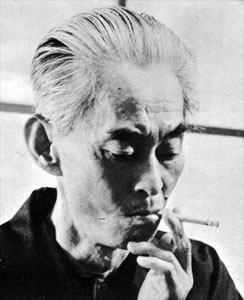
Yasunari Kawabata (11 juni 1899 — 16 april 1972)
De Franse schrijver Jules Vallès werd geboren op 11 juni 1832 in Puy-en-Velay, Haute-Loire. Vallès was een van de kopmannen van de Parijse Commune van 1871. Na de bloedige week wist hij te ontsnappen naar Engeland en kon pas in 1880 terugkeren. Als schrijver was hij vergeten totdat hij in Frankrijk zo’n 20 jaar geleden werd (her)ontdekt. Hij wordt nu als een van de grootste schrijvers uit de 19e eeuw gezien. In zijn boeken beschrijft hij het leven in Frankrijk en Parijs voor en tijdens de Commune van Parijs. Hij was een strijdmakker van o.a. Paul Lafargue, de schoonzoon van Karl Marx en van Eugène Pottier, de dichter van de Internationale. Hij werkte onder andere mee aan de dagbladen ‘La Révolution française’ en ‘Cri du Peuple’, het eerste grote revolutionaire dagblad na de Commune.
Uit: L’Enfant
“Ai-je été nourri par ma mère?Est-ce une paysanne qui m’a donné son lait?Je n’en sais rien.Quel que soit le sein que j’ai mordu, je ne me rappelle pas une caresse du temps où j’étais tout petit; je n’ai pas été dorloté, tapoté, baisotté; j’ais été beaucoup fouetté.
Ma mère dit qu’il ne faut pas gâter les enfants, et elle me fouette tous les matins; quand elle n’a pas le temps le matin, c’est pour midi, rarement plus tard que quatre heures.
Mlle Balandreau m’y met au suif.
C’est une bonne vieille fille de cinquante ans. Elle demeure au-dessous de nous. D’abord elle était contante: comme elle n’a pas d’horloge, ça lui donnait l’heure.
“Vlin! Vlan! Zon! Zon!-voilà le petit Chose qu’on fouette; il est temps de faire mon café au lait.”
Mais un jour que j’avais levé mon pan, parce que ça me cuisait trop,et que je prenais l’air entre deux portes, elle m’a vu; mon derrière lui a fait pitié.
Elle voulait d’abord le monter a tout le monde, ameuter les voisins autour; mais elle a pensé que ce n’était pas le moyen de le sauver, et elle a inventé autre chose.
Lorsqu’elle entend ma mère me dire: “Jacques, je vais te fouetter!
-Madame Vingtras, ne vous donnait pas la peine, je vais faire ça pour vous.
-Oh! chère demoiselle, vous êtes trop bonne!”

Jules Vallès (11 juni 1832 – 14 februari 1885)
Portret door Gustave Courbet
De Engelse dichter en satiricus George Wither werd geboren op 11 juni 1588 in Bentworth. Zie ook mijn blog van 11 juni 2007
Veil, lord, mine eyes till she be past
Veil, Lord, mine eyes till she be past,
When Folly tempts my sight;
Keep Thou my palate and my taste
From gluttonous delight.
Stop Thou mine ear from sirens’ songs,
My tongue from lies restrain;
Withhold my hands from doing wrongs,
My feet from courses vain.
Teach, likewise, ev’ry other sense
To act an honest part,
But chiefly settle innocence
And pureness in my heart;
So naught without me or within,
Shall work an ill effect,
By tempting me to act a sin,
Or virtues to neglect.
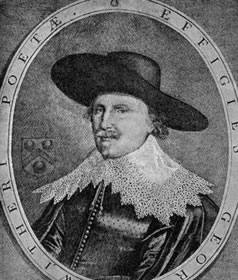
George Wither (11 juni 1588 – 2 mei 1667)
De Engelse dichter en vertaler Barnabe Googe werd geboren op 11 juni 1540 in Londen of Kent. Hij studeerde aan het Christ’s College, Cambridge. Hij verhuisde daarna naar Staple’s Inn, waar ook zijn neef William Lovelace verbleef. Hij begon te dichten en ontmoette ook andere dichters en schrijvers als Jasper Heywood en George Turberville. Ook had hij nauwe contacten met het hof van koningin Elisabeth. Hij begeleidde Sir Thomas Challoner op een diplomatie missie naar Spanje.
Of Money
Give money me, take friendship whoso list,
For friends are gone, come once adversity,
When money yet remaineth safe in chest,
That quickly can thee bring from misery;
Fair face show friends when riches do abound;
Come time of proof, farewell, they must away;
Believe me well, they are not to be found
If God but send thee once a lowering day.
Gold never starts aside, but in distress,
Finds ways enough to ease thine heavin.

Barnabe Googe (11 juni 1540 – 1594)
Een bewaard gebleven 16e eeuws steegje in Londen, West End.
Ook de ramen links zijn 16e eeuws. (Geen portret beschikbaar)
Onafhankelijk van geboortedata:
De Catalaanse dichter, schrijver en vertaler Eduard Escoffet werd geboren in Barcelona in 1979. Het zwaartepunt ligt bij zijn gedichten op klankpoëzie en performance, Ook vertaalde hij werk van Goethe, Quasimodo en M. Lenz. Ook was hij initiatiefnemer tot het festival voor experimentele literatuur PROPOSTA. Zijn eigen werk verschijnt wel in allerlei tijdschriften en bloemlezingen, maar uit ecologische overwegingen heeft hij nog geen eigen bundel uitgegeven.
sie haben alle schulen geschlossen
sie haben alle schulen geschlossen. es wird dort nicht mehr lesen gelernt. es wird dort nicht mehr schreiben gelernt. wir haben alle wörter geschlossen. da die körper nicht mehr so lange halten, wie sie sollten – so wie die nacht und das blinde feuer der minnenden –, ist es besser, die wörter beiseite zu lassen. heute sorgen sich die mütter nicht mehr um die kinder und die schule und die stunden. heute kümmern sich die mütter, weit entfernt von der väterwärme, nur noch um die uniformen. und die söhne werkeln oder verformen ihre körper. sie haben alle kleidungsstücke verfleckt. trotzdem: sie können nicht mehr schreiben, und lesen können sie auch nicht mehr. und die nacht, schwach und kurz, nimmt zwei körper auf, die sich verformen. wie die wörter, aber ohne wörter.
Vertaald door Àxel Sanjosé

Eduard Escoffet (Barcelona, 1979)



